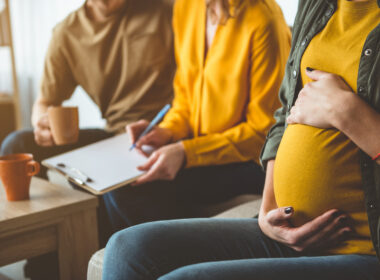My fertility journey was a rite of passage from start to finish. At the age of 12, I had my first period. Things were bumpy at first, stable for a while, and then rather chaotic when I was diagnosed with infertility in my late thirties. After undergoing various treatments and a surgery, my infertility seemed like it was going to be permanent. This was confirmed when I discovered I was on my way towards menopause at the age of 48.
Despite all of the obvious signs, learning I was nearing ménopause was still surprisingly upsetting. The last ten years had been filled with irregular cycles, night sweats, les déséquilibres hormonaux, and a slew of other physical symptoms that made me believe I was going mad. In spite of that, I genuinely thought it would be awhile until my menstrual cycles came to an end. While I didn’t feel totally prepared for menopause and aging, there are so many more resources out there than ever before that women can take advantage of even before menopause hits. In this article, I’ll share a few that I’ve found most helpful–and how I learned to cope with the finality of menopause after years of infertility.
Officially hitting menopause–and grieving infertility all over again
It all started during a routine checkup, where a series of blood draws were ordered. Once the results came in, it was clear my ovaries were closing shop. I felt like a dried prune. Speechless and gasping for air, I called my close friend. Through tears, I shared how my already broken fertility was now buried and would never come to life again.
Grieving infertility the first time around had been a harrowing enough process. I was no stranger to grief, and thought I had become accustomed to it. After all, I had to grieve many milestones that never became possible: a positive pregnancy test, a pregnancy announcement, a gender reveal … Via adoption, we were blessed with three beautiful children. It was the highlight of my infertility journey. Still, inside my heart, I always held on to the possibility of achieving a pregnancy. Acceptance finally came after years of therapy, tears, and prayer. But just when I thought my grieving process was done, I was faced with having to grieve my fertility all over again. This time, it was final: I would no longer have menstrual cycles, and there would never again be the possibility of conception.
Via adoption, we were blessed with three beautiful children. It was the highlight of my infertility journey. Still, inside my heart, I always held on to the possibility of achieving a pregnancy. Acceptance finally came after years of therapy, tears, and prayer.
Since I was not fully prepared for this change, I got to work and went down the menopause rabbit hole. I searched online and read as much as I could about what was to come. The information was overwhelming, to say the least. So was the realization that I was ten years behind in preparing for menopause. But I eventually decided that dwelling on lost time was pointless. This was the time to act! It didn’t matter when I started the journey towards prioritizing my health in menopause. What mattered was that I was starting now.
Finding the right menopause support team
Social media was my first stop. It was the perfect place to find other women in my situation. On YouTube, after looking at various channels, I came across Kari Anne Wright. Her channel was geared at women going through périménopause and those already in menopause. Her videos were not only filled with humor, but also tips and tricks. She also shared her personal experiences with all the perimenopause symptoms, medical issues, and doctor appointment mishaps. I felt like I had found a digital best friend that “got me.”
Livres
Being an avid reader, I also searched for books on the topic. That’s how I found these two books: The New Menopause et How To Menopause. The first is written by Dr. Mary Claire Haver, an OBGYN who specializes in the field of menopause. The other is written by a former journalist, Tamsen Fadal, who shares her struggles with menopause and how she managed the transition. I have read both and learned so much from each of them. Most of all, it was encouraging to know I was not alone. I felt confident that I would and could “succeed” in my menopause. Their Instagram accounts (@drmaryclaire and @tamsenfadal) also contain a lot of valuable information and advice.
The right doctor—and treatment plan
As for the medical aspect of menopause, it was important to find a doctor that would listen and not say, “this is normal,” “it’s a part of life,” “maybe you need a vacation,” or my personal favorite, “here are some anti-depressants for those mood swings.”
Fortunately, my family doctor had already suspected I was going through perimenopause and she could tell menopause was approaching. She put me on a treatment plan and monitored my health through a series of blood work and doctor visits when necessary. After much discussion, I started hormone replacement therapy, took a series of supplements, made nutritional changes and started an exercise regimen. It is a misconception to believe that menopause is only about hormones. Our brain, heart, bones, and joints all need help during this transitional phase.
As I mentioned before, when I first began processing the fact that I was in menopause, I thought a lot about when I had learned I was infertile. My struggle with infertility had been a devastating time in my life and was difficult to work through. It wasn’t until I saw my infertility as a gift that I began to use that “gift” to help others. I trained as a FertilityCare practitioner and taught the Méthode Creighton—a fertility awareness method based on glaire cervicale observations. I became part of a ministry that helped women facing infertility. I met and became friends with extraordinary women who helped me face the darkest moments of my own infertility journey. Now, I had to learn how to use my new “gift” of menopause to help women in that season of life.
Awareness is a key part of my desire to advocate for women approaching menopause. The only way to bring awareness is to speak to women about it. It’s important because many women don’t even know they are in perimenopause. Their symptoms are often dismissed by their doctors, or they’re led to believe their discomfort is due to typical daily stress. For this reason, I never miss an opportunity to talk to and try to educate women. If we don’t utilize our own experience to help others, then what are we doing?
Fortunately, this is a great time to be transitioning into menopause. There is constantly new research being done. New studies, treatment plans, and resources are available. Women have a lot more support offered to them. They are also banding together via social media to share, encourage, and support others in this season of life. Virtual clinics have also become more common to ensure women have easier access to medical professionals that deal exclusively with menopausal women.
Menopause and aging
Change is never easy, and menopause and aging is a big change in a woman’s life that can be tough to navigate. It can be scary and feel lonely, but it doesn’t have to be this way. I can’t say I am an expert when it comes to perimenopause or menopause. But I can say that I know a lot more than I did a year ago. I keep on learning something new each day. When a new symptom arises, I go back to the drawing board. Being menopausal no longer scares me. It empowers me.
I keep on learning something new each day. When a new symptom arises, I go back to the drawing board. Being menopausal no longer scares me. It empowers me.
Though menopause is a natural part of a woman’s life, it still brought me some sadness–and I think that’s normal. But it won’t take away my deep-rooted desire to continuously advocate for women’s reproductive health. Whether through sharing my story, supporting someone, or raising awareness, I will not let another woman dismiss her perimenopausal symptoms. If you are struggling with perimenopause or menopause, know there is a lot of support online waiting for you! You don’t have to be caught off-guard by menopause.






